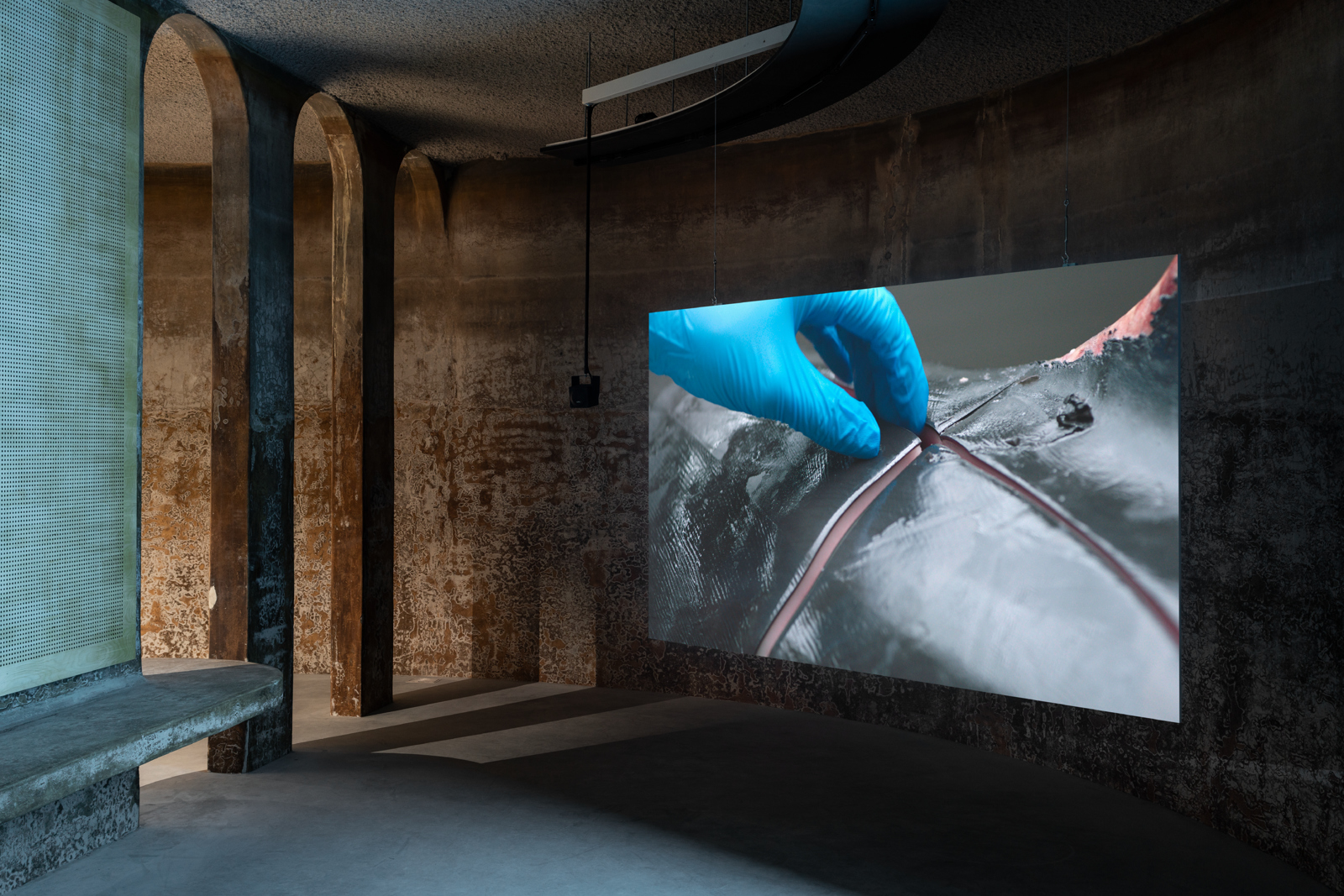Blind Men
2022
“Blind Men is a video and sound composition that provides an intimate glimpse into a sterile necropsy room—an inquest room for scientific research—in which a beached whale is presented for pathological examination. Filmed close to the skin, the blurred camera image shows small fragments of the whale’s body. The only way in which the viewer can see a total picture is by imaginatively puzzling the fragments together. With this, Blind Men evokes the parable from the story ‘The Blind Men and the Elephant’, in which the limits of human perception are demonstrated and the imagination is actively addressed. Blind Men’s fragmented impressions encourage attentive and careful observation. Sound plays an essential role in obtaining a parallel experience of the environment, dominated by rustling cold rooms, humming extractor hoods and latex gloves. By means of a spatial, multi-channel sound installation, the exhibition space is approached acoustically in a way that is more similar to the way a blind person or a whale experiences it: by sensing it based on hearing.
Blind Men plays with a high degree of abstraction that makes it challenging to distinguish body and environment from each other. In this way, Mascini wants to address the porosity and connection between bodies and environments and establish the profound, reciprocal relationship between the two. For Mascini, this has been a central factor in approaching the subject, experiencing the whale’s body as an alienating archive in which traces of human society are stored, accumulated over the centuries. Apart from the history of processing whale bodies into various products and applications used in human society, there is also a long history of humans entering whale bodies. The story of Jonah and the Whale is perhaps the most famous example, but recent scientific studies have also found traces of human industries accumulating in the tissue of whales, making whales some of the most polluted animals in the world. This kind of anthropogenic traces of contamination are central to the current pathological research that takes place at the Faculty of Veterinary Medicine at Utrecht University, where Blind Men is recorded. The body as a toxic archive, in which an apparently external world has a major internal influence. A world in which a single element can expose a whole chain of (eco)systems and industries, as evidence of a deep and sometimes disturbing entanglement between existences.”
*This text was co-written by Vibeke Mascini and Niekolaas Lekkerkerk for the exhibition guide of Vibeke’s solo exhibition at RADIUS CCA, The world is a verb (10 July - 11 September 2022)
2022
“Blind Men is a video and sound composition that provides an intimate glimpse into a sterile necropsy room—an inquest room for scientific research—in which a beached whale is presented for pathological examination. Filmed close to the skin, the blurred camera image shows small fragments of the whale’s body. The only way in which the viewer can see a total picture is by imaginatively puzzling the fragments together. With this, Blind Men evokes the parable from the story ‘The Blind Men and the Elephant’, in which the limits of human perception are demonstrated and the imagination is actively addressed. Blind Men’s fragmented impressions encourage attentive and careful observation. Sound plays an essential role in obtaining a parallel experience of the environment, dominated by rustling cold rooms, humming extractor hoods and latex gloves. By means of a spatial, multi-channel sound installation, the exhibition space is approached acoustically in a way that is more similar to the way a blind person or a whale experiences it: by sensing it based on hearing.
Blind Men plays with a high degree of abstraction that makes it challenging to distinguish body and environment from each other. In this way, Mascini wants to address the porosity and connection between bodies and environments and establish the profound, reciprocal relationship between the two. For Mascini, this has been a central factor in approaching the subject, experiencing the whale’s body as an alienating archive in which traces of human society are stored, accumulated over the centuries. Apart from the history of processing whale bodies into various products and applications used in human society, there is also a long history of humans entering whale bodies. The story of Jonah and the Whale is perhaps the most famous example, but recent scientific studies have also found traces of human industries accumulating in the tissue of whales, making whales some of the most polluted animals in the world. This kind of anthropogenic traces of contamination are central to the current pathological research that takes place at the Faculty of Veterinary Medicine at Utrecht University, where Blind Men is recorded. The body as a toxic archive, in which an apparently external world has a major internal influence. A world in which a single element can expose a whole chain of (eco)systems and industries, as evidence of a deep and sometimes disturbing entanglement between existences.”
*This text was co-written by Vibeke Mascini and Niekolaas Lekkerkerk for the exhibition guide of Vibeke’s solo exhibition at RADIUS CCA, The world is a verb (10 July - 11 September 2022)
Audio visual installation. 4 channel soundcomposition, 4K video, 11min21sec
Advice and support:
Lonneke IJsseldijk, Linde van Schalkwijk and Manon Lock, Utrecht University, Faculty of Veterinary Medicine
Cinematography: Rik Komáromi
Editting: Vibeke Mascini and Oscar Santillán
Soundcomposition: Malu Peeters
Technical Production: Dario Giustarini, Stichting Azimuth
Published writing about Blind Men: De Groene Amsterdammer (NL), Trouw (NL)
image 1 exhibition still RADIUS CCA / photo: Gunnar Meier
image 2-3 video stills
Advice and support:
Lonneke IJsseldijk, Linde van Schalkwijk and Manon Lock, Utrecht University, Faculty of Veterinary Medicine
Cinematography: Rik Komáromi
Editting: Vibeke Mascini and Oscar Santillán
Soundcomposition: Malu Peeters
Technical Production: Dario Giustarini, Stichting Azimuth
Published writing about Blind Men: De Groene Amsterdammer (NL), Trouw (NL)
image 1 exhibition still RADIUS CCA / photo: Gunnar Meier
image 2-3 video stills


